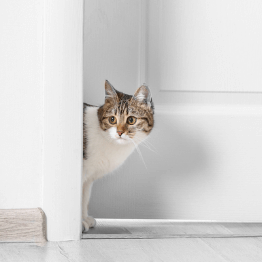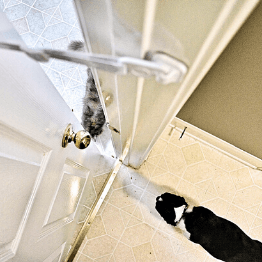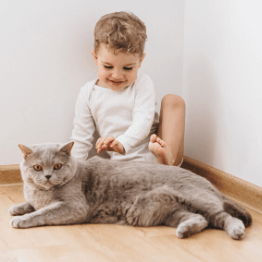CATS WITH ALLERGIES - DO YOU HAVE A SENSITIVE FELINE FUR-END?
While we often hear of cat allergy symptoms being a menace for us hoomans, did you know they can be a bother to your furry friend too? Cats with allergies can be quite ordinary with little to worry about. However, understanding the signs and signals can seriously help make a difference in having a happy kitty.
From seasonal sniffing to the occasional sneeze, your cat can be suffering from one allergy or another. Here are some cat allergy symptoms to look out for and what they are caused by.
CAT ALLERGY SYMPTOMS
When a cat is allergic to something, common indications will be:
- Itchy skin
- Coughing and/or sneezing,
- Vomiting or diarrhea (in the case of a digestive allergy)
Sensitivity to fleas, foods, things inhaled, or something they have come in contact with are the most likely causes for allergies in cats. More severe cat allergy symptoms like vomiting or inflammation shouldn’t be ignored. If these symptoms tend to persevere or worsen over time, we highly recommend taking your purrfect pet to your local vet.
COMMON CAT ALLERGIES
Now that we know what to look out for, here are the top common cat allergies that may be riddling your home.
Skin Irritation
Is there anything worse than an itch you just can’t seem to scratch? Now, imagine being your cat. Skin irritations can be precisely that; irritating for both you and your cat.
The good news is that this type of contact allergy generally results in a relatively localized reaction on the skin. The cat may scratch a lot, or there may be an indication of irritation at the place of contact.
The most common causes of contact allergies in cats would obviously be items with which they come in close contact, such as flea collars, bedding, toys, etc.
The simplest cure is to remove the contact and give their bedding or toys a thorough clean. Of course, should these symptoms worsen, a particular medication may be needed, and a trip to the vet won’t do you or your pet any harm.
Flea Allergies
Flea allergies are very common in cats. An average cat may simply bite or scratch for a while and then go on to other things, but a cat with a flea allergy may scratch, chew, and worry at the spot until large amounts of fur are lost. This is where professional help comes highly recommended!
Air Irritants
Do you suffer from seasonal hay fever? Is there anything worse than suffering from the irritants in the spring air?
Well, inhalant types of allergies like these are probably the most common in cats, and your cat can be allergic to the exact same allergens that you are.
Tree pollens, grass pollens, and weed pollens along with the rest of the items we humans fear can be affecting your furry friend too.
Mold, mildew, dust mites, and dust itself can all trigger allergic reactions in cats as well, which may lead to a stuffing nose and sneezing.
Food Allergies
As in humans, true food allergies in cats can be challenging to pinpoint, which makes treating cat allergies tricky too.
One reason is that they commonly demonstrate many of the symptoms of distress seen in the other groups of allergies.
True food allergies in cats can cause itching and/or respiratory problems. Most food allergies will center around the type of protein that’s common in the cat's diet, such as beef, pork, poultry, or lamb.
Eliminating that type of protein by changing to another kind of food will usually take care of the problem.
When it comes to cat allergies, Door Buddy can help you keep your kitty away from the things that cause allergies. Our adjustable pet door strap can block a cat's entry to a room, without requiring you to close the door fully.
Door Buddy also makes it possible for you to create a sanctuary for your cat, free of the things that they are allergic to, or that stress them out (a.k.a. the dog!).
Having cats with allergies doesn’t have to leave you feeling a little sick yourself. Knowing what treating cat allergies means and what the common cat allergies are will definitely make your life and your kitty’s much more comfortable.








